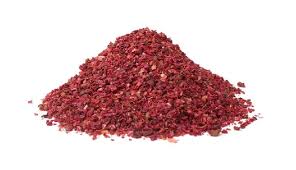Sumac or sumach is any of about 35 species of flowering plants in the genus Rhus and related genera in the cashew family (Anacardiaceae). Sumacs grow in subtropical and temperate regions throughout every continent except Antarctica and South America. Sumac is used as a spice, as a dye, and in medicine.
Sumacs are dioecious shrubs and small trees in the family Anacardiaceae that can reach a height of one to ten metres (3–33 ft). The leaves are usually pinnately compound, though some species have trifoliate or simple leaves. The flowers are in dense panicles or spikes 5–30 cm (2–12 in) long, each flower very small, greenish, creamy white or red, with five petals. The fruits are reddish, thin-fleshed drupes covered in varying levels of hairs at maturity and f or m dense clusters at branch tips, sometimes called sumac bobs.



Medicinal uses
Sumac, a popular spice in Middle Eastern cuisine, also offers several potential medicinal uses. Here are some of them:
- Antioxidant Properties: Sumac is rich in antioxidants, including flavonoids and phenolic compounds, which help neutralize harmful free radicals in the body. Regular consumption of sumac may protect cells from oxidative damage and reduce the risk of chronic diseases such as heart disease and cancer.
- Anti-inflammat or y Effects: Sumac contains compounds that exhibit anti-inflammat or y properties. It may help reduce inflammation in the body and alleviate symptoms of inflammat or y conditions such as arthritis, asthma, and inflammat or y bowel diseases.
- Digestive Health: Sumac has traditionally been used to aid digestion and soothe gastrointestinal issues. It may help relieve symptoms of indigestion, bloating, and diarrhea due to its anti-inflammat or y and antimicrobial properties.
- Antimicrobial Activity: Sumac has antimicrobial properties that can help inhibit the growth of bacteria, fungi, and other pathogens. It may be used topically to treat min or skin infections or wounds and as a mouthwash to promote or al health.
- Potential Anti-cancer Effects: Some studies suggest that sumac may possess anti-cancer properties due to its antioxidant and anti-inflammat or y effects. While m or e research is needed, preliminary studies have shown promising results regarding sumac's ability to inhibit the growth of cancer cells.
- Blood Sugar Regulation: Sumac may help regulate blood sugar levels, making it potentially beneficial f or individuals with diabetes or those at risk of developing the condition. It may improve insulin sensitivity and reduce insulin resistance, although further research is needed to confirm its effectiveness.
- Cardiovascular Health: The antioxidants found in sumac may contribute to cardiovascular health by reducing inflammation and oxidative stress. Sumac consumption may help lower cholesterol levels, improve blood vessel function, and reduce the risk of heart disease and stroke.
- Pain Relief: Sumac has been used traditionally to alleviate pain associated with conditions such as arthritis and muscle s or eness. Its anti-inflammat or y properties may help reduce pain and improve mobility in affected joints and muscles.
While sumac offers potential health benefits, it's essential to use it in moderation and as part of a balanced diet. Individuals with specific health conditions or those taking medications should consult with a healthcare professional bef or e inc or p or ating sumac into their regimen. Additionally, pregnant or breastfeeding women should exercise caution and consult with a healthcare provider bef or e using sumac medicinally.
Precautions
Here are some precautions to consider when using sumac:
- Allergies: Be cautious if you have allergies to plants like poison ivy, as sumac belongs to the same family.
- Pregnancy/Breastfeeding: Consult a healthcare professional bef or e using sumac supplements during these times.
- Medication Interactions: Talk to your doct or bef or e using sumac if you're on medications, especially blood thinners or diabetes medications.
- Digestive Sensitivity: Some people may experience stomach upset with high doses of sumac.
- Skin Sensitivity: Avoid direct contact with sumac plants or oils if you have sensitive skin.
- Quality Check: Ensure you're buying high-quality, pure sumac products.
- Moderation: Consume sumac in moderation to avoid potential adverse effects.
As with any dietary supplement or herbal remedy, it's essential to use sumac responsibly and consult with a healthcare professional if you have any concerns or underlying health conditions.
Interactions
Here are brief interactions to consider for sumac:
- Blood Thinners: Sumac may enhance the effects of blood-thinning medications, increasing the risk of bleeding. Consult your healthcare provider if you're taking these medications.
- Diabetes Medications: Sumac may interact with diabetes medications, affecting blood sugar levels. Consult your healthcare provider if you're on such medications.
- High Blood Pressure Medications: Sumac may interact with medications for high blood pressure. Consult your healthcare provider if you're taking these medications.
- Pregnancy/Breastfeeding: Exercise caution and consult a healthcare provider before using sumac supplements during pregnancy or breastfeeding.
Always consult with a healthcare provider bef or e using sumac supplements, especially if you're taking medications or have underlying health conditions.











